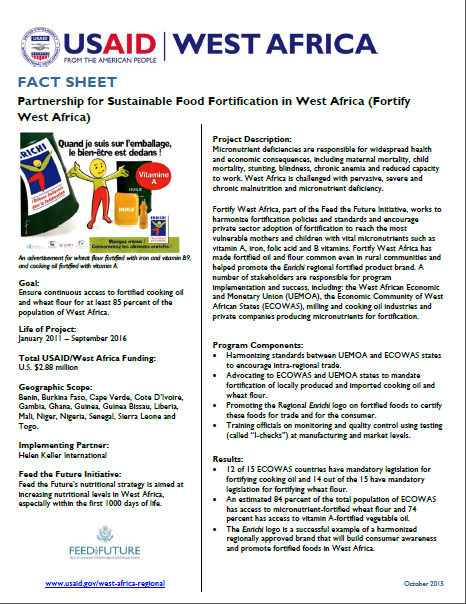Goal:
Ensure continuous access to fortified cooking oil and wheat flour for at least 85 percent of the population of West Africa.
Life of Project:
January 2011 – January 30, 2017
Total USAID/West Africa Funding:
U.S. $2.88 million
Geographic Scope:
Benin, Burkina Faso, Cape Verde, Cote D’Ivoire, Gambia, Ghana, Guinea, Guinea Bissau, Liberia, Mali, Niger, Nigeria, Senegal, Sierra Leone and Togo.
Implementing Partner:
Helen Keller International
Feed the Future Initiative:
Feed the Future’s nutritional strategy is aimed at increasing nutritional levels in West Africa, especially within the first 1000 days of life.
Project Description:
Micronutrient deficiencies are responsible for widespread health and economic consequences, including maternal mortality, child mortality, stunting, blindness, chronic anemia and reduced capacity to work. West Africa is challenged with pervasive, severe and chronic malnutrition and micronutrient deficiency.
Fortify West Africa, part of the Feed the Future Initiative, works to harmonize fortification policies and standards and encourage private sector adoption of fortification to reach the most vulnerable mothers and children with vital micronutrients such as vitamin A, iron, folic acid and B vitamins. Fortify West Africa has made fortified oil and flour common even in rural communities and helped promote the Enrichi regional fortified product brand. A number of stakeholders are responsible for program implementation and success, including: the West African Economic and Monetary Union (UEMOA), the Economic Community of West African States (ECOWAS), milling and cooking oil industries and private companies producing micronutrients for fortification.
Program Components:
• Harmonizing standards between UEMOA and ECOWAS states to encourage intra-regional trade.
• Advocating to ECOWAS and UEMOA states to mandate fortification of locally produced and imported cooking oil and wheat flour.
• Promoting the Regional Enrichi logo on fortified foods to certify these foods for trade and for the consumer.
• Training officials on monitoring and quality control using testing (called “I-checks”) at manufacturing and market levels.
Results:
• 12 of 15 ECOWAS countries have mandatory legislation for fortifying cooking oil and 14 out of the 15 have mandatory legislation for fortifying wheat flour.
• An estimated 84 percent of the total population of ECOWAS has access to micronutrient-fortified wheat flour and 74 percent has access to vitamin A-fortified vegetable oil.
• The Enrichi logo is a successful example of a harmonized regionally approved brand that will build consumer awareness and promote fortified foods in West Africa.








Comment
Make a general inquiry or suggest an improvement.